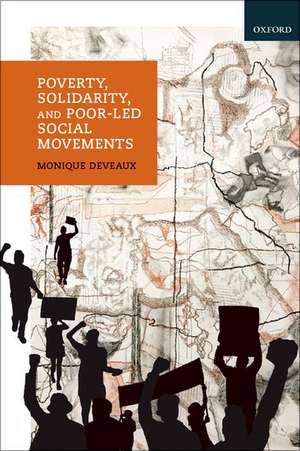Poverty, Solidarity, and Poor-Led Social Movements
Autor Monique Deveauxen Limba Engleză Hardback – 22 noi 2021
Preț: 412.89 lei
Preț vechi: 485.75 lei
-15% Nou
Puncte Express: 619
Preț estimativ în valută:
79.04€ • 82.47$ • 66.26£
79.04€ • 82.47$ • 66.26£
Carte disponibilă
Livrare economică 19 februarie-05 martie
Livrare express 05-11 februarie pentru 32.24 lei
Preluare comenzi: 021 569.72.76
Specificații
ISBN-13: 9780190850289
ISBN-10: 0190850280
Pagini: 280
Dimensiuni: 229 x 152 x 23 mm
Greutate: 0.54 kg
Editura: Oxford University Press
Colecția OUP USA
Locul publicării:New York, United States
ISBN-10: 0190850280
Pagini: 280
Dimensiuni: 229 x 152 x 23 mm
Greutate: 0.54 kg
Editura: Oxford University Press
Colecția OUP USA
Locul publicării:New York, United States
Recenzii
In this volume, Deveaux challenges the all-too-common assumption that poor people are not at the forefront of movements for social change ... She insightfully writes about specific examples in various parts of the world in which those in poor-run movements employ inventive strategies.
Monique Deveaux makes a compelling case that perspectives of the global poor have been neglected in ways that define, frame, and present misguided solutions to the relevant issues. Recognizing the moral and political agency of the poor is not just a missed opportunity. It is an important corrective to a field that has gotten off track. This book is important reading and its theses highly plausible.
By recognizing poor-led groups as agents of justice and acknowledging their central importance for challenging the institutional structures that keep some people subordinated in conditions of poverty, Monique Deveaux takes a significant step forward in advancing a transformative antipoverty agenda. This compelling book makes an important contribution to both political and normative discussions of responsibility and poverty while providing insights into the current struggles and capacities of specific poor-led social movements.
Poverty, Solidarity, and Poor-Led Social Movements takes up the question – what would a theory of global justice look like if we took seriously the agency and insights of people in poverty. She finds that they are not merely resisting their circumstances and advocating for other political actors to help them, but rather developing and strengthening their political capacities within political community and across solidarity networks in order to bring about change locally, nationally, and transnationally. As a matter of normative theory, paying attention to their politicization of poverty, Deveaux argues, leads to different responsibilities for those with means, power, and privilege than those which are familiar in global justice theory .... Deveaux offers an important contribution to global justice theory and a model of how to do grounded normative theory without fieldwork.
This book will act as a blueprint for future scholarly attempts to engage in these oft-overlooked nonideal questions, especially given the way it is able to combine relatively abstract political theorizing so successfully with empirical work from critical development scholars and social movement researchers.
Monique Deveaux makes a compelling case that perspectives of the global poor have been neglected in ways that define, frame, and present misguided solutions to the relevant issues. Recognizing the moral and political agency of the poor is not just a missed opportunity. It is an important corrective to a field that has gotten off track. This book is important reading and its theses highly plausible.
By recognizing poor-led groups as agents of justice and acknowledging their central importance for challenging the institutional structures that keep some people subordinated in conditions of poverty, Monique Deveaux takes a significant step forward in advancing a transformative antipoverty agenda. This compelling book makes an important contribution to both political and normative discussions of responsibility and poverty while providing insights into the current struggles and capacities of specific poor-led social movements.
Poverty, Solidarity, and Poor-Led Social Movements takes up the question – what would a theory of global justice look like if we took seriously the agency and insights of people in poverty. She finds that they are not merely resisting their circumstances and advocating for other political actors to help them, but rather developing and strengthening their political capacities within political community and across solidarity networks in order to bring about change locally, nationally, and transnationally. As a matter of normative theory, paying attention to their politicization of poverty, Deveaux argues, leads to different responsibilities for those with means, power, and privilege than those which are familiar in global justice theory .... Deveaux offers an important contribution to global justice theory and a model of how to do grounded normative theory without fieldwork.
This book will act as a blueprint for future scholarly attempts to engage in these oft-overlooked nonideal questions, especially given the way it is able to combine relatively abstract political theorizing so successfully with empirical work from critical development scholars and social movement researchers.
Notă biografică
Monique Deveaux is Professor of Philosophy and Canada Research Chair in Ethics and Global Social Change at the University of Guelph, in Ontario, Canada. She is the author of Gender and Justice in Multicultural Liberal States (Oxford University Press, 2006), Cultural Pluralism and Dilemmas of Justice (Cornell University Press, 2000), and a co-editor of volumes on multiculturalism and the thought of philosopher Onora O'Neill. She has written widely on diversity, deliberative democracy, gender equality, exploitation, and poverty.
